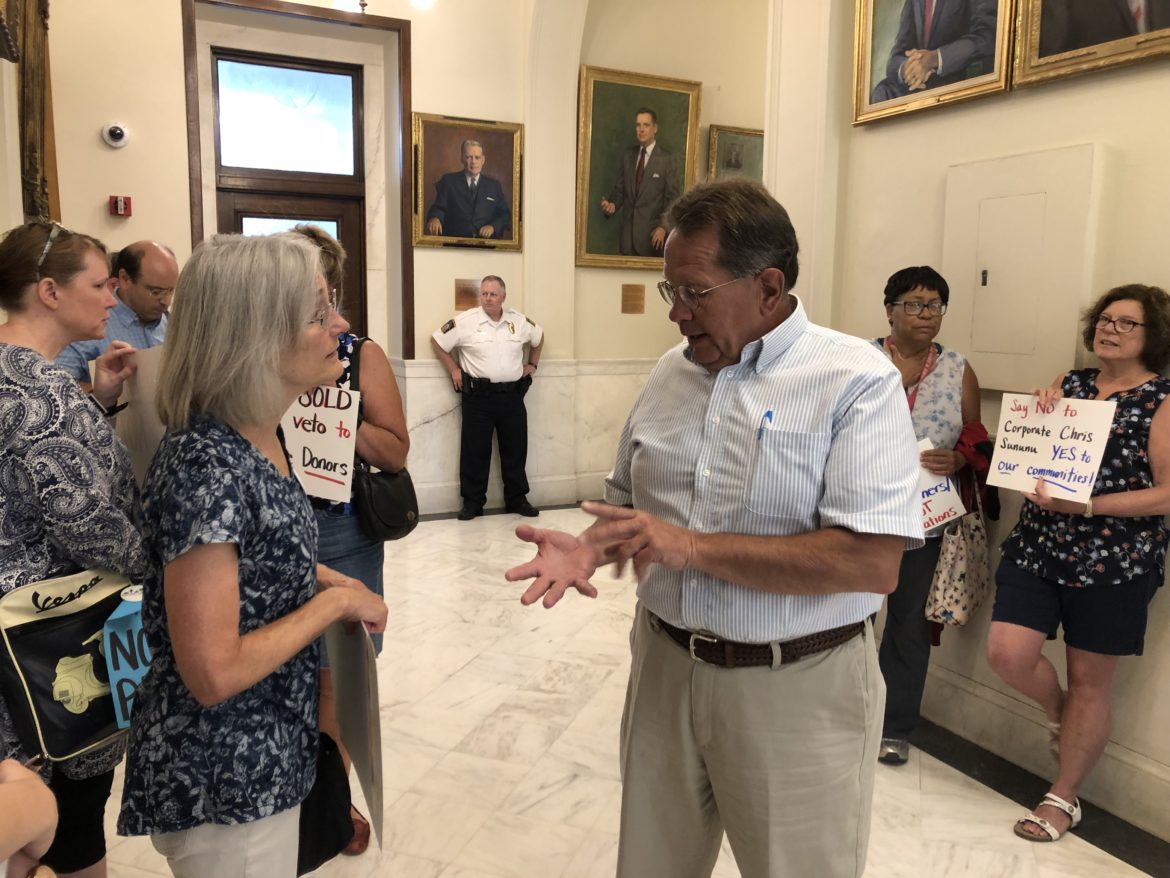By PAULA TRACY, InDepthNH.org
CONCORD – Protesters packed the hallway outside the Executive Council chambers Friday as Republican Gov. Chris Sununu held a closed-door meeting on the budget with representatives from cities and towns across the state.
More than 30 mayors, city managers, and select board members were signed in at the closed-door meeting. Among those attending were officials from Derry, Manchester, Rochester, Epping, New Hampton, Chester, Keene, Charlestown, Antrim, Tuftonboro, Bedford, Canterbury, Milford, Nashua, and Berlin.
Legislators, the press and the public were not allowed into the meeting to hear what the governor had to say about the current stalemate between the executive and legislative branches over his budget veto.
But after the meeting the governor spoke as did some of the attendees.
New Hampshire still needs to find a budget compromise for the next two years, which began July 1.
The House and Senate agreed to a $13.3 billion, two-year budget which offered more money for cash-strapped municipalities where some property taxpayers are struggling. Currently, the state is operating on a continuing resolution for the next three months, essentially keeping funding at the current levels.
But for some municipalities, the lack of a budget will mean layoffs in a month or so, said Mayor Paul Grenier of Berlin.
With the budget passed in the House and Senate, Berlin was looking at getting an extra $4.2 million over and above what the governor had planned. Now, Grenier said, they will be losing $230,000 in current state aid for this year and will be forced to layoff people.
“We’re likely talking 10 to 15 positions,” by the end of August, he said. “I am angry and disappointed.” Going into the meeting, Grenier, a Democrat who formerly supported Sununu, said he expected to hear a “snow job.”
Protesters holding signs outside of the closed-door meeting sang Pete Seeger’s “Everybody’s Got a Right to Live….” and asked whether the governor is for the people or for big business.
After the meeting, Gary Daniels, Republican chair of the Board of Selectmen in Milford, said it was interesting to hear the governor talk about the budget, the differences in versions and where he felt common ground could be met.
“I very much appreciated his transparency,” he said. “This is a common problem, and everyone needs to be on the same team.”
William Boyd III, town councilor for Merrimack, talked about the revenue stabilization piece of the governor’s budget. “He’s taken a sensible approach” to the budget, he said.
Democratic
Mayor Jim Donchess of Nashua said there was a consensus among municipal
representatives about “huge property tax increases resulting from the
state downshifting,” or reducing aid over time. “I am hoping we can
work toward the House and Senate budget,” Donchess said.
The Democratic leaders of both the House and Senate sent their own letter to select boards across the state because “we believe it is important for you to receive the full story on the budget,” wrote Senate President Donna Soucy and Speaker of the House Steve Shurtleff, both Democrats.
It noted that the budget passed in committees of the conference, added $200 million more to communities for education funding and municipal aid.
Soucy and
Shurtleff wrote that Democrats made concessions to the governor such as taking
out the Family Medical Leave Act. The governor said he would veto a budget that
closed the capital gains loophole to fund education, and they took that out of
the budget as well.
The governor, they asserted, has not given up anything and has not negotiated.
A main sticking point between the two sides is Democrats want to hold off on projected business profits tax reductions.
“If we move toward another round of tax breaks, the state will be left with a $90 million revenue gap. These funds are critical to building this budget which provides municipal aid, increase in education funding and addresses the crises with the opioid epidemic, mental health crisis, and child protection crisis,” the joint letter from Democratic leadership said.
In inviting municipal officials to Friday’s talk, the governor put out his pitch as well, urging them to contact their senators and legislators to support his position. To support what the Democrats want, would be to put New Hampshire on a road to an income tax, Sununu said.
“It contains a $93 million structural deficit in Fiscal Year 2021 – a deficit of this size can only be closed through massive reductions of services or a massive increase in taxes – neither of which I can support – and both of which would hurt your communities,” the governor wrote in his July 9 letter.





